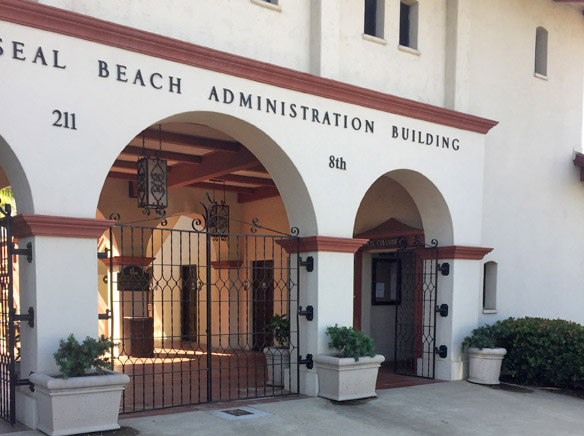Editor’s note: The second reading and approval of the city’s new parking laws have been placed on the Consent Calendar for the Monday, Dec. 10, Seal Beach City Council meeting.
Several Seal Beach residents last week shared their displeasure with a proposed change to the city’s parking laws that would require residents to move their cars 150 feet every 72 hours.
Despite a cold, rainy night, many Seal Beach residents attended a Thursday, Nov. 29, town hall meeting about parking in the Council Chambers. Several council members were in the audience.
The Seal Beach City Council in November voted 4-0 to approve the introduction (or first reading) of an ordinance revising Seal Beach’s parking code. The issue is expected to return to the council.
Julie Dixon, the city’s parking consultant, explained that the California Vehicle Code defines a car as “stored” when it is left at a location for 72 hours.
The proposed change to the city’s parking laws would require everyone in the city to move their cars at least 150 feet every 72 hours to qualify as having been moved.
“I know that we got a lot of feedback about this,” Dixon said.
One man said the proposal was punishing residents. “Why can’t residents park in front of their own house?”
Seal Beach Police Commander Steve Bowles said you don’t own the curb in front of your home.
Later in the evening, Bowles said he had had people move their cars 3 feet forward and 3 feet back.
He said the 150-feet requirement “just gives us an option.”
One woman suggested limited parking on Main Street.
A second man said, “Less is more,” apparently referring to parking rules. He argued that the rules should be data-driven. “Our lovely small town is getting regulated to death,” he said.
A third man said 150 feet was unnecessary.
Yet another man argued there should be a way to exempt residents.
During the November council meeting on the new parking ordinance, District Councilman Thomas Moore proposed making an exception for homeowners, but the proposal died.
District One Councilwoman Ellery Deaton suggested changing the rule to require cars to move less than 150 feet. Deaton also suggested vacation permits for people parking their cars.
One woman argued that there were many car break-ins in hear neighborhood.
She argued that under the 150 feet rule, they would have to go a long way to determine if the car alarm they heard was their car. Dixon said police were also dealing with car alarms going off at night, as well as 911 calls.
Another woman said that if residents paid for their residential parking sticker, that ought to be enough.
Dixon pointed out that the 72-hour rule is complaint-driven in Seal Beach.
District Planning Commissioner Victor Grgas pointed out that new state laws allow the conversion of garages into apartments without prior notice to the community and that would impact parking in many areas of Seal Beach. (Old Town and Surfside are exempted from the “accessory dwelling unit” rules because the areas are built-out.)
Grgas said the biggest problem was people not using garages for parking.
Grgas also pointed out that there were streets with not enough room for fire vehicles.
Dixon pointed out that police have in the past made arrangements for people when they have a parking issue that will not allow them to move their car for 72 hours.
Commander Bowles said police would find a place for people to park near the police station or the Seal Beach Animal Care Center.
Bowles asked the press to tell the public that the police would not provide valet parking. Everyone laughed.
Bruce Bennett said, “Parking has been a problem at the beach since I’ve been born.”
Bowles said that the hardest part of writing regulations was dealing with everyone’s issues. “Every block has its own set of issues,” he said.
Another issue that came up was the fact that the city is seeking approval for “Local Coastal Program” from the California Coastal Commission.
“We have a lot to fear,” Deaton said. “They have a lot of goals that are not our goals.”




